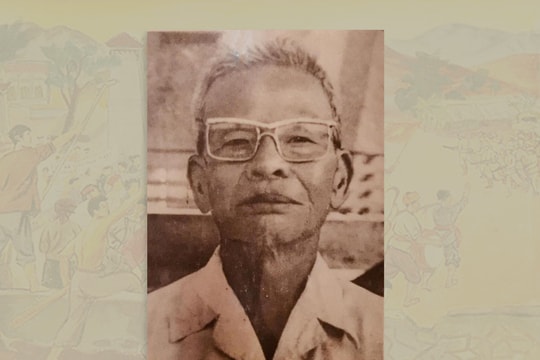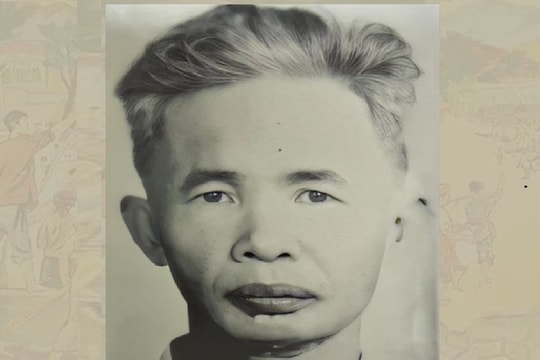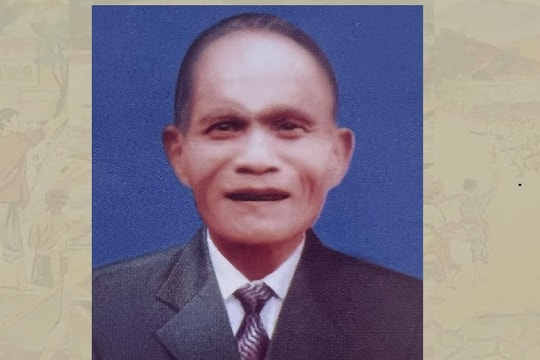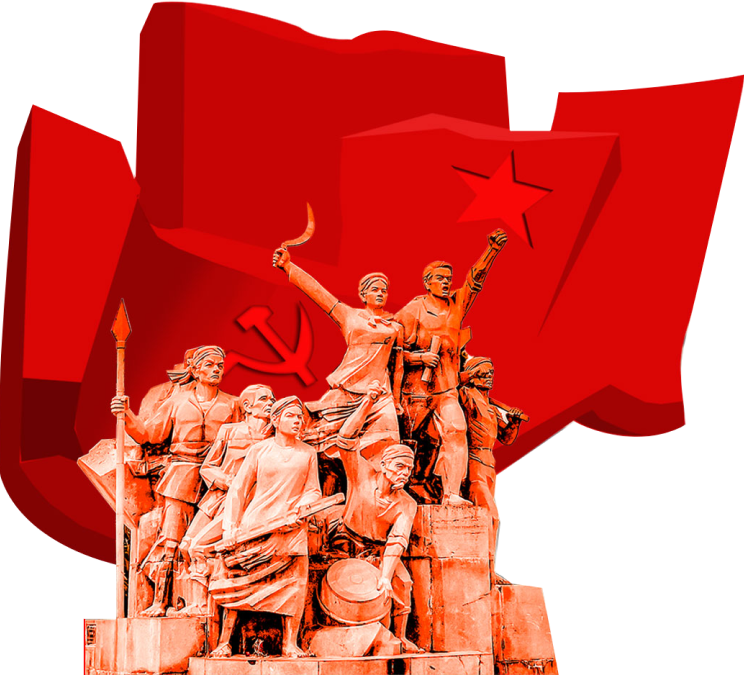Comrade Le Dinh Troi - A typical revolutionary soldier of his hometown Loc Ha, Ha Tinh
“If there is still one hour left, we will make revolution, comrade Duong!”… That was the affirmation of comrade Le Dinh Troi to wholeheartedly follow the Party to make revolution after experiencing years of suffering torture in imperialist prisons.
Comrade Le Dinh Troi (aka Hong Quan) was born in 1903 in Vinh Phuc village, Vinh Luat commune, Vinh Luat canton, Thach Ha district (now Mai Phu commune, Loc Ha district, Ha Tinh province) in a poor family with a strong patriotism. Despite difficult circumstances, as a tailor, Mr. Le Dinh Bao - comrade's father still tried to save money for his son to study Chinese characters. Being an intelligent and studious person, Le Dinh Troi quickly completed the Four Books, Minh Tam, and Khuyen Hieu.
In 1913, due to poor family conditions, Le Dinh Troi had to drop out of school and work for a landlord. From here, he soon realized the hard life and misery of people who lost their country.
In July 1925, the Phuc Viet Association (later renamed Hung Nam, Tan Viet) was established at Con Meo Mountain, Vinh - Ben Thuy with the motto of uniting progressive patriotic forces to make a revolution to drive out the invading imperialists and gain freedom for the nation. In mid-1927, this patriotic organization developed strongly in Thach Ha, the intellectual youth here divided into villages in the district to build bases attracting a large number of people to participate, including Le Dinh Troi.
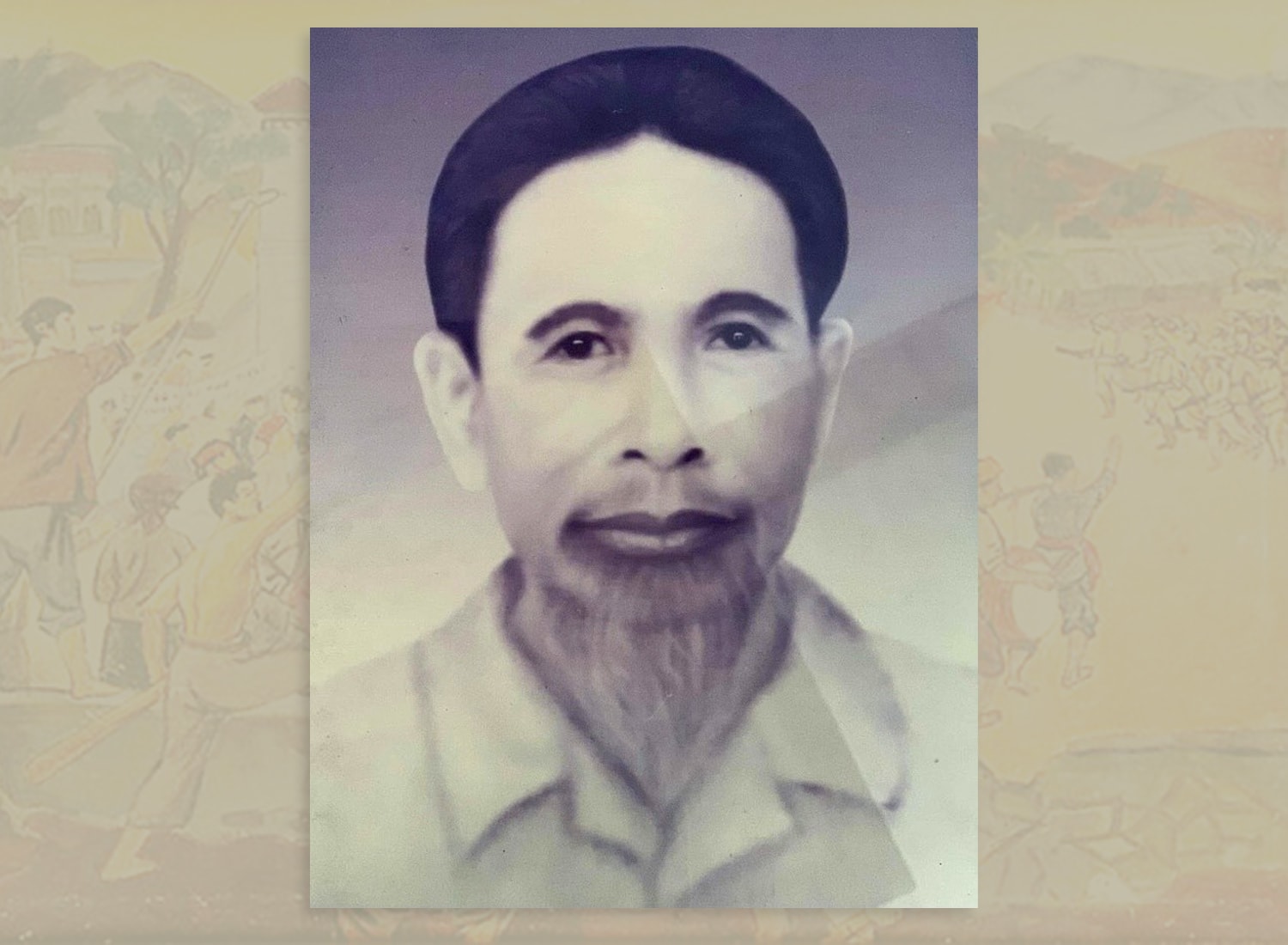
After the Ha Tinh Provisional Provincial Party Committee was established (March 1930), many Party cells in Can Loc and Thach Ha were formed. Can Loc District had the Dinh Lu Party Cell. Comrade Ho Phoi (in Phu Luu Thuong, now Hong Loc Commune, Can Loc) was contacted by the Ha Tinh Provisional Provincial Party Committee and assigned the task of building Party bases in Canh Hoach and Vinh Luat communes. Receiving the new task, comrade Ho Phoi directly contacted comrade Le Dinh Troi and comrade Nguyen Trach to build a base of operations. After a period of testing, comrades Le Dinh Troi and Nguyen Trach were admitted to the Party at the Dinh Lu Party Cell introduced by comrade Ho Phoi. In that sacred moment, Le Dinh Troi swore to "be a pioneer for life, fulfilling all tasks assigned by the Party even if I die...". After being admitted, comrade Le Dinh Troi was assigned the task of establishing contacts and propagating the development of the Party organization in Vinh Luat commune. From here, Vinh Luat commune had its first communist nuclei.
In August 1930, the provisional Provincial Party Committee met in Vinh Hoa (Binh Loc) to consider the building of the Party organization, organizing the masses, developing the struggle movement and electing the provisional district committee. Comrade Nguyen Duong from Huu Phuong village (actively living in Da Loc Party Cell) was elected to the District Committee, in charge of Canh - Vinh communes. At the same time, the Canh - Vinh General Committee was also established with comrade Nguyen Duong as Secretary and comrade Le Dinh Troi as Deputy Secretary.
After the Vinh Luat Party Committee was officially recognized (August 1930), Le Dinh Troi was assigned as Secretary.(1). Accepting the new task was extremely difficult and dangerous because this was a place with a strong struggle movement, the enemy often carried out severe terror, secret police searched everywhere to arrest the Party's key leaders and those participating in the struggle, but comrade Le Dinh Troi always tried to complete the task well. With his quickness and courage, Le Dinh Troi and the Party cell established mass organizations such as: Red Relief, Masons Association...
Under the leadership of Ha Tinh Provincial Party Committee and Thach Ha District Party Committee, the establishment of Vinh Luat General Party Cell opened a new step of development for the local revolutionary movement.
On November 7, 1930, on the occasion of the 13th anniversary of the Russian October Revolution, the people of Vinh Luat commune (including the villages of Mai Lam, Vinh Luat, Trieu Son, Vinh Tuy) together with the people of Ho Do, Loc Nguyen, Gia Thien, Xuan Hoa communes... gathered at Ru Bong to demonstrate and give speeches with slogans: "Support the Soviet Union"; "Reduce taxes for the people"; "Overthrow imperialism and feudalism".
On January 16, 1930, the Party cell led the people of Vinh Luat commune to fight for the price of dew-covered rice, while shouting the slogans: "Abolish the unreasonable ceiling and shackles on the people, the local authorities must pay the price of dew-covered rice to the poor, must abolish the right to force people to pay money to buy cows and pigs for offerings, if anyone does not follow the association, they must be punished appropriately" (Public version)(2).
On the occasion of the anniversary of the Guangzhou Commune (December 12, 1930), the District Party Committee directed the mass organizations in the two regions of Ha Dong and Ha Tay to demonstrate their power. Particularly in the villages of Mai Phu, the Party mobilized women and well-off families to prepare 200 rice balls to distribute to the protesting forces.
According to the plan, the masses gathered in two clusters (at the banyan tree in Loi hamlet and Trieu Son communal house) and then gathered at Con Doong (Thach My). The protest group advanced to Do Diem ferry, but people from Canh Hoach commune were crossing the river to gather at Doi hill, so the groups from Ha Dong and Ha Tay regions had to board Kenh Can ferry to cross the river. When they reached Cay bridge (Thach Thuong), they were terrorized by the enemy, and the protest groups from both Canh and Vinh communes could not enter the town. During this protest, comrade Le Dinh Troi was assigned the task of commanding the people of Vinh Luat commune to march to Da Phuc communal house (Vinh Luat) to listen to the speech of their superiors. After this event, the revolutionary spirit of the masses rose even higher in the villages.
To denounce the enemy's crimes and mobilize the masses to fight against the tyrants, Thach Ha District Party Committee assigned Vinh Luat Party Cell to organize the printing of documents and distribute leaflets in many villages in the area. At that time, comrade Le Dinh Troi's house was the place where party members held quick meetings.
Since December 1930, the colonial government and the feudal court carried out a series of sweeps and arrests in an attempt to suppress and quell the revolutionary movement. However, comrade Le Dinh Troi continued to lead the Party cell in the struggle. To support party members in difficulty, the Nghia Thuong Committee was established with comrade Le Dinh Troi as head, comrade Nguyen Kinh as deputy head and Mr. Pham Ba Huyen as treasurer. The Committee secretly raised money to help revolutionary cadres. At this time, the movement temporarily subsided, party members went into secret activities, but the movement was still maintained.
In April 1931, comrade Le Dinh Troi was appointed as Deputy Secretary of Canh district, and at the same time assigned the task of collecting rice from those who had the spirit of contributing to the victims.
In August 1931, comrade Le Dinh Troi fell into the enemy's hands. Despite being brutally beaten and tortured, he still gritted his teeth and refused to confess. After a period of imprisonment in Thach Ha prison, in January 1932, he was exiled to Kon Tum prison. With the intention of crushing the fighting spirit of generations of political prisoners, the French colonialists implemented many brutal repressive policies. However, the enemy's cunning and cruelty could not subdue the steadfast revolutionary spirit and the indomitable will of the communist soldiers. Here, comrade Le Dinh Troi continued to fight with his fellow prisoners in many forms such as: hunger strike, distributing leaflets in Chinese, Chinese, and Vietnamese, hanging hammer and sickle slogans...
In 1935, facing the brutal beatings and terror of prisoners, comrade Le Dinh Troi, along with comrades Nguyen Duy Trinh and Ho Tung Mau, filed a petition to the prison. Afterwards, the enemy arrested comrade Le Dinh Troi and 11 other comrades, including Ho Tung Mau, Nguyen Duy Trinh, Ngoc Danh, Nguyen Tuan... and imprisoned them separately in Ban Me Thuot. After the time of solitary confinement, they sent them to prison in prison number two.(3).
During the years of fighting in the imperial prison, comrade Le Dinh Troi always upheld his integrity, constantly studied Party history, considered prison a place to train the personality and qualities of a revolutionary soldier, and remained loyal to the honorable promise of a Party member.
In June 1936, the Popular Front led by the French Communist Party won the National Assembly election and implemented a number of progressive policies such as: releasing political prisoners in prisons, establishing a Colonial Investigation Committee, collecting people's aspirations, and implementing a number of social reforms for working people. Thanks to that, a series of political prisoners detained by the enemy were released, including comrade Le Dinh Troi. Upon returning home, he continued his activities, connecting with former party members such as comrade Nguyen Chung Anh in Kim Doi, Nguyen Mau Quynh in Dong Luu, Nguyen Duong in Huu Phuong... to rebuild the revolutionary movement, and at the same time build a Viet Minh cell in Can Loc.(4).
Under the leadership of the Provincial Party Committee, Thach Ha District Party Committee, Canh - Vinh General Party Committee, including comrade Le Dinh Troi, the revolutionary movement in Vinh Luat commune was rekindled. Party members and the masses here operated secretly, in legal and semi-legal forms, to propagate against superstition, to propagate the national language, and to secretly popularize patriotic poetry.
During the process of contacting the Canh Vinh General Committee, comrade Le Dinh Troi always received close instructions from his superiors when he returned to work in the locality. To hide from the enemy, he joined a sewing group at comrade Nguyen Duong's house in Huu Phuong. During this time, comrade Le Dinh Troi regularly attended meetings, promptly grasped the policies and instructions of his superiors to organize implementation in Vinh Luat.
In 1939, the danger of World War II was getting closer. The government of the French Popular Front was overthrown. In the country, the French colonialists and the feudalists of the Southern Dynasty launched a campaign of terror, relentlessly hunting down communist soldiers, including those they had just released. In Thach Ha, the Party organization had not been restored for long when some opportunists tried to sabotage it. As a result, many key party members fell into the hands of the enemy, including comrade Le Dinh Troi. After two years of imprisonment in Can Loc district prison, in August 1941, he was exiled to Ly Hy prison (Phu Bai - Hue), where he continued to fight with his fellow prisoners.
On March 9, 1945, Japan ousted France from Indochina, many party cadres and members escaped from prison, comrade Le Dinh Troi was also released during this period. After being released from prison, regardless of difficulties and dangers, he continued to initiate revolutionary activities. At this time, Le Dinh Troi actively mobilized the masses to join the Mutual Aid Association, fight against the oppression of the tyrants, and distribute rice to the people.
On May 19, 1945, the Nghe Tinh Inter-Provincial Viet Minh Mobilization Committee was established to gather forces and unify actions, preparing for the uprising to seize power. Comrade Le Dinh Troi actively worked in the Viet Minh organization, participating in the movement to seize power.
On the morning of August 17, 1945, the Viet Minh front in Thach Ha met to convey orders from superiors and urgently prepare for a general uprising in the entire district. On the evening of August 17, 1945, the Thach Ha district uprising committee organized a mass demonstration to force the district chief to surrender. Under the direction of comrade Thai Van Tuyet, at dawn on August 18, 1945, comrade Le Dinh Troi was assigned the task of directing more than 50 people, including party members and the masses, to raise high the red flag with yellow star to demonstrate and go to the houses of village chiefs in the villages to force them to surrender their seals. In just a short time, the uprising to seize power in the villages of Canh - Vinh commune won complete victory without any bloodshed. From September 1945 to September 1949, comrade Le Dinh Troi was elected Chairman of the Provisional People's Committee and the Administrative Resistance Committee of Bac Vinh commune.
From September 1949 to 1952, he was a police officer in Ha Tinh province. In 1983, he passed away after a serious illness at the age of 80. With his contributions to the revolutionary movement, on October 13, 1997, he was awarded the Third Class Independence Medal by the President in Decision No. 11KT/CT. The life and revolutionary career of comrade Le Dinh Troi will forever be a shining example for today's young generation to learn and follow.
Note:
(1) Memoirs of comrade Le Dinh Troi kept at the Nghe Tinh Soviet Museum
(2) Memoirs of comrade Le Dinh Troi kept at the Nghe Tinh Soviet Museum
(3) Memoirs of comrade Le Dinh Troi kept at the Nghe Tinh Soviet Museum
(4) History of Mai Phu Commune Party Committee - Hong Duc Publishing House, Hanoi 2017
References:
Memoirs of comrade Le Dinh Troi kept at the Nghe Tinh Soviet Museum
History of the Party Committee of Mai Phu Commune, Loc Ha District, Hong Duc Publishing House, Hanoi, 2017
History of Thach Ha District Party Committee, National Political Publishing House, 1997
Background information provided by family.

.jpg)
